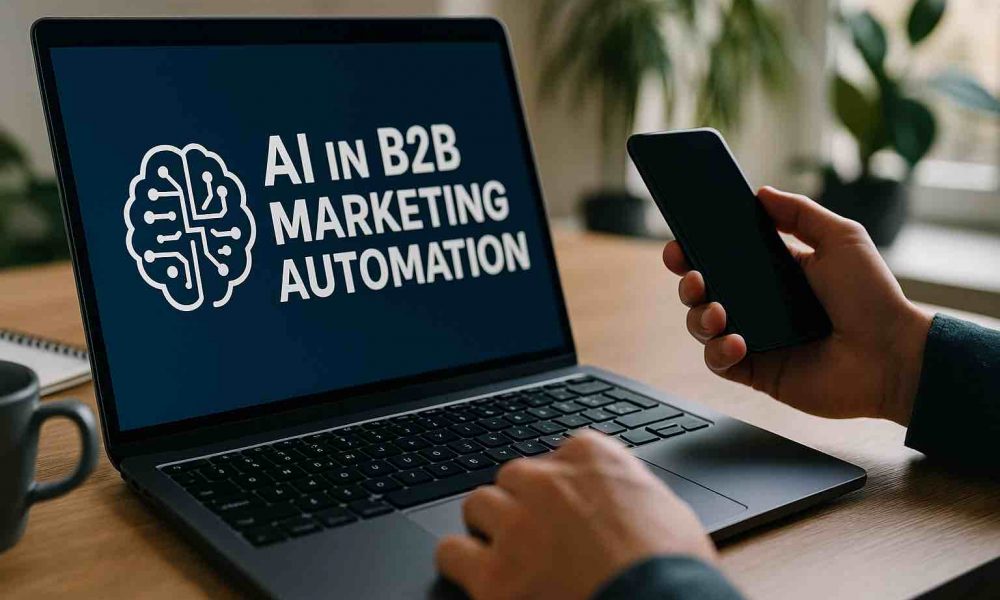Best practices for implementing Growth Systems For B2B in your company
Reinvent Your Organization: Just How AI Automation Is Changing B2B Procedures
AI automation is reshaping B2B procedures in significant means. Firms are adopting this modern technology to enhance process and boost performance. As jobs become automated, organizations can concentrate on strategic growth as opposed to ordinary processes. The effects of these changes are extensive, affecting every little thing from consumer communications to provide chain monitoring. Recognizing this improvement is crucial, as the future of organization depend upon the effective integration of AI into everyday operations. What lies in advance in this advancing landscape?
Understanding AI Automation in B2B Context
As organizations progressively look for efficiency, comprehending AI automation within the B2B context comes to be essential. AI automation describes the application of man-made knowledge technologies to improve and boost organization processes. In B2B atmospheres, this can materialize in numerous kinds, such as automating information entry, enhancing supply chain logistics, or boosting supply monitoring. Organizations leveraging AI automation can reduce functional prices, decrease human error, and rise performance. AI devices can examine huge amounts of information to provide actionable insights, enabling informed decision-making. The combination of AI right into B2B operations not just transforms typical workflows however also promotes dexterity and scalability, permitting services to adjust to market changes swiftly and properly. Embracing this modern technology is vital for staying competitive in today's digital landscape
Enhancing Client Experience Via AI
How can AI change customer interactions in the B2B sector? AI enhances client experience by offering personalized, prompt, and efficient solution. Virtual assistants and smart chatbots can deal with questions 24/7, guaranteeing clients get prompt responses. AI Automation For B2B. Anticipating analytics enable companies to expect client requirements, tailoring offerings as necessary. AI-driven systems can assess consumer data, enabling targeted marketing strategies and improved engagement. Additionally, view evaluation devices analyze client feedback, helping companies fine-tune their services. By automating routine jobs, AI releases up personnels to focus on high-value interactions, fostering more powerful connections. The combination of AI not only improves communication yet likewise constructs trust fund and loyalty, ultimately raising the total customer experience in the competitive B2B landscape

Streamlining Supply Chain Administration With AI
AI plays a necessary function in enhancing supply chain monitoring via anticipating analytics and automated supply control. By leveraging anticipating analytics, companies can anticipate demand variations and change their operations as necessary. Automated supply systems additionally enhance effectiveness by ensuring stock degrees are maintained, minimizing waste and improving total performance.
Anticipating Analytics Benefits
While many businesses encounter difficulties in handling intricate supply chains, anticipating analytics provides a transformative option by leveraging large quantities of data to forecast patterns and maximize procedures. By evaluating historic data alongside real-time inputs, anticipating analytics allows firms to determine patterns and anticipate future needs. This insight allows for even more informed decision-making, enhancing performance and decreasing prices. Furthermore, services can proactively address prospective disturbances by predicting supply chain bottlenecks and readjusting strategies appropriately. The assimilation of anticipating analytics not only enhances inventory monitoring but additionally fosters stronger connections with providers and consumers through prompt feedbacks to market changes. Ultimately, the adoption of anticipating analytics encourages organizations to stay affordable in an increasingly dynamic organization environment.
Automated Inventory Control
As services progressively depend on predictive analytics to optimize supply chain procedures, automated inventory control becomes a powerful ally in this effort. By leveraging AI-driven technologies, business can improve accuracy in stock tracking, decrease stockouts, and decrease excess inventory. Automated systems analyze real-time data, allowing services to predict demand fluctuations and adjust supply degrees accordingly. This not just improves order satisfaction but likewise improves money flow management by decreasing holding prices. In addition, AI can determine patterns in acquiring behavior, making it possible for even more informed decision-making relating to supplier connections and purchase techniques. Inevitably, automated supply control not just boosts functional efficiency but additionally boosts client contentment by making certain product availability, strengthening its function as an important component in contemporary supply chain management.
Data-Driven Choice Making Powered by AI
In today's competitive landscape, organizations progressively rely upon data-driven decision-making to enhance operational effectiveness and strategic preparation. Synthetic knowledge plays an essential function in this makeover by examining large quantities of data swiftly and precisely. AI algorithms determine patterns, trends, and anomalies that human experts might ignore, making it possible for services to make informed choices based upon real-time insights. This ability allows business to predict market shifts, enhance source allotment, and customize their offerings to consumer needs. Furthermore, AI-driven analytics facilitate threat assessment and administration, ensuring that companies can navigate uncertainties effectively. By leveraging these sophisticated devices, companies not just improve their decision-making procedures but also acquire an affordable advantage in their particular markets, promoting development and innovation.
Automating Repetitive Tasks to Increase Efficiency

Incorporating AI With Existing Organization Procedures
When integrating AI with existing business procedures, several companies encounter difficulties. These difficulties frequently come from an absence of recognizing regarding just how AI can complement current process. Effective integration calls for a comprehensive assessment of existing operations to determine areas where AI can add worth. Organizations needs to additionally ensure you can try here that their groups are outfitted with the required abilities to leverage AI tools properly. Additionally, smooth assimilation depends upon the compatibility of AI innovations with tradition systems. Companies usually find it advantageous to embrace a phased method, piloting AI applications in details divisions before a broader rollout. This method permits modifications based upon first responses, guaranteeing smoother changes and making the most of the possible advantages of AI automation in boosting efficiency and efficiency.
Future Fads in AI Automation for B2B Companies
As B2B companies look to the future, improved information analytics is readied to play a critical role in driving decision-making procedures. Intelligent process automation will also become a key pattern, boosting and simplifying procedures efficiency. These developments promise to reshape how companies operate, inevitably bring about even more dexterous and receptive organizations.
Boosted Information Analytics
While services progressively count on data-driven decisions, the function of AI in improving data analytics is coming to be extra essential in B2B procedures. AI modern technologies help with the collection and analysis of vast datasets, allowing companies to uncover beneficial insights that drive critical planning. Anticipating analytics powered by AI enables organizations to forecast market trends and customer actions with better accuracy. Additionally, machine learning algorithms improve data analysis, recognizing patterns that human analysts might forget. This causes more educated decision-making and maximized resource allocation - B2B Growth Consulting. As B2B business continue to welcome AI-driven analytics, they can anticipate better operational performance, boosted client experiences, and an affordable side on the market. The future of information analytics in B2B depends upon integrating sophisticated AI abilities
Intelligent Refine Automation
Smart Process Automation (IPA) is poised to transform B2B procedures by effortlessly incorporating AI technologies with conventional service procedures. This cutting-edge technique integrates robot process automation (RPA) with sophisticated AI capacities, making it possible for organizations to enhance effectiveness and accuracy. Companies can automate repetitive jobs, such as information entrance and billing handling, enabling employees to concentrate on critical campaigns. IPA likewise leverages artificial intelligence and natural language handling, enhancing decision-making with real-time information analysis. As businesses progressively embrace IPA, they can expect substantial expense reductions and enhanced client experiences. Future trends indicate an expanding reliance on IPA for scalability and versatility, placing companies to prosper in an ever-evolving marketplace. Accepting IPA will certainly be important for maintaining competition in the digital age.
Regularly Asked Questions
What Industries Benefit A Lot Of From AI Automation in B2B Workflow?
Production, logistics, financing, and healthcare markets profit most from AI automation in B2B operations. These sectors utilize automation to improve efficiency, lower costs, simplify processes, and enhance decision-making with data-driven understandings and anticipating analytics.
How Can Tiny Businesses Execute AI Automation Effectively?
Tiny services can apply AI automation effectively by identifying recurring jobs, choosing suitable tools, integrating options progressively, educating personnel, and continually assessing performance to optimize procedures, making certain a smooth changeover and maximizing performance. AI Automation For B2B.
What Are the Costs Connected With AI Automation Execution?
The costs connected with AI automation implementation typically include software program procurement, infrastructure upgrades, training team, recurring upkeep, and prospective examination charges. These expenses can differ significantly based upon the range and intricacy of the automation solutions chosen.
How Do I Determine ROI From AI Automation Initiatives?
To measure ROI from AI automation initiatives, one must evaluate price savings, efficiency improvements, and revenue growth versus execution costs. Tracking key efficiency signs gradually provides useful insights into performance and general return on investment.
What Abilities Are Needed to Handle AI Automation Projects?
Effective management of AI automation projects requires skills in task administration, data evaluation, programming, and understanding AI modern technologies. Additionally, solid interaction, analytic capacities, and flexibility are necessary for steering the intricacies of such campaigns.
As companies progressively look for effectiveness, comprehending AI automation within the B2B context ends up being important. The assimilation of AI right into B2B procedures not just transforms conventional workflows however likewise fosters agility and scalability, enabling organizations to adapt to market changes promptly and successfully. While organizations progressively depend on data-driven choices, the duty of AI in enhancing information analytics is becoming more essential in B2B procedures. Intelligent Refine Automation (IPA) is positioned to reinvent B2B procedures by perfectly integrating AI technologies with conventional company processes. Reliable monitoring of AI automation projects calls for abilities in job monitoring, data evaluation, programming, and recognizing AI innovations.